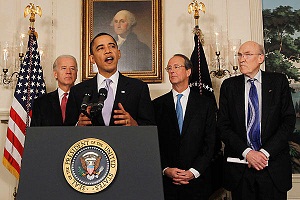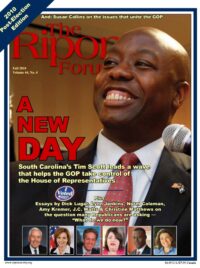 They say money is a leading cause of divorce; it surely was on November 2nd. Voters divorced Democratic officeholders nationwide because of money, e.g., spending and debt. Meanwhile, the debt commission created by President Obama to recommend “fiscal responsibility and reform” is scheduled to report on December 1st. By then, however, the lame duck Congress may have made more multi-trillion-dollar decisions, from the fate of the Bush tax cuts to the FY2011 budget continuing resolution.
They say money is a leading cause of divorce; it surely was on November 2nd. Voters divorced Democratic officeholders nationwide because of money, e.g., spending and debt. Meanwhile, the debt commission created by President Obama to recommend “fiscal responsibility and reform” is scheduled to report on December 1st. By then, however, the lame duck Congress may have made more multi-trillion-dollar decisions, from the fate of the Bush tax cuts to the FY2011 budget continuing resolution.
In press reports, the commission chairs have said they will recommend, if they can reach consensus, a mixture of spending cuts and tax increases. Their work, even if untimely, will still be valuable if it goes beyond mere numbers to propose free market-based tax and fiscal reforms to reignite our sputtering economic engine.
There wasn’t a bipartisan love-fest when the commission was formed, so hope for bipartisan consensus and recommendations may be naïve now. At the time, Minority Leader John Boehner wondered why the Administration would wait to cut spending when we are in a fiscal crisis. In this, the United States can learn from Donald Rumsfeld’s Old Europe. Leaders in France, Germany and the United Kingdom have proposed (and are enduring civil unrest over) fiscal austerity programs. Meanwhile, we’ve been busy: studying. It’s an ironic metaphor for our recent economic incompetence.
The mid-term elections may reduce the commission’s recommendations to an inside-the-beltway stalking horse, where the Obama Administration and media use them to criticize Republicans, who have their own debt reduction plans.
The mid-term elections may reduce the commission’s recommendations to an inside-the-beltway stalking horse…
In September, Boehner set out a two-point plan that would immediately cut non-security related government spending to FY2008 levels, and impose a two year freeze on all current tax rates. The likely, new Chairmen of budget-related House committees, Dave Camp (Ways & Means), Jerry Lewis (Appropriations) and Paul Ryan (Budget), endorsed it. More recently, Boehner said that in the next Congress the House will move legislation, weekly, to cut spending and do everything possible to stop full implementation of the Obama health reform law.
Last April, Ryan issued his own budget blueprint. Calling it “no ordinary budget,” Ryan said it would accomplish four main goals 1) fulfill the mission of health and retirement security; 2) control our Nation’s debts; 3) put the economy on a path of growth and leadership in the global economy; and 4) preserve the American legacy of leaving the next generation better off.
Ryan offered the hope – and the commission can amplify it – that the debt debate will be comprehensive. It should be about tax policy goals, not just tax rates. It should define our vision for trade and competitiveness, for safety nets and education. The aftermath of the 2008 financial crisis has shown how dramatically economic trends are shifting towards emerging economies. The United States is not entitled to be the world’s leader; we have to earn it by setting a long-term, viable course for innovation and growth.
An honest divorcee will admit that more than money wrecked the marriage. There were arguments over children, vision and values, in short, over family policy. The same is true for voters – they divorced the Democratic Party over more than money. It was also the uncertainty caused by intrusive, coercive fiscal policies.
An honest divorcee will admit that more than money wrecked the marriage … The same is true for voters – they divorced the Democratic Party over more than money.
The new GOP House majority’s plans are aimed at reducing this uncertainty. The commission can support this by proposing reforms to restrain an unwieldy government that has paralyzed job creation.
Nancy Pelosi and Chris Dodd said about the health care and financial regulatory reform bills, respectively, that we had to pass them to know what’s in them. Truer words have never been spoken. Thousands of pages of new legislation, and thousands of regulations yet to be written, affect employers and employees. Small businesses aren’t expanding or hiring because they don’t know what to expect tomorrow. Multinational corporations are preserving cash and cutting costs because they don’t know what profit penalties tomorrow will bring. We have been in a state of fiscal insanity – impulsive legislation and unpredictable outcomes. High unemployment and under-employment are predictable results.
The commission’s recommendations will contribute much if they stop the insanity, if they include ideas to foster economic growth through private capital and entrepreneurship, and if they propose a policy scalpel – to work alongside a budget ax – to create a bigger economic pie rather than re-slice a stagnant one.
On November 2nd, a majority voted to divorce a political party which believes every economic conversation should begin and end with the word “Washington.” Ideally, the commission will offer proposals that remove government-created uncertainty and unshackle our dynamic private sector.
Stacy Carlson was Speechwriter to Secretary of the Treasury Hank Paulson and is the author of You, Me & the U.S. Economy, A Plainspoken Story of Financial Crisis.




